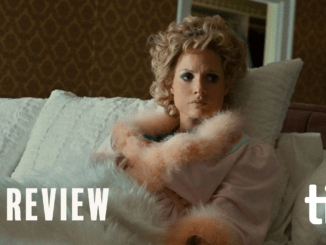Paul Feig does Hitchcock? Seems like a pretty ridiculous statement considering Feig’s filmography and comedic background. This is the man that brought us the canceled too soon, Freaks and Geeks, as well as solid female-led comedy efforts such as Bridesmaids, The Heat, Spy, and the Ghostbusters reboot. Nothing among those tiles suggest that he could tackle a mystery thriller but Feig does just that with A Simple Favor.
It’s not fair to simply label A Simple Favor as a standard mystery thriller and this is likely why Paul Feig was the correct choice to helm the project. While a lot of thriller elements are in place, A Simple Favor is also a biting dark comedy that pokes fun at suburban mom life while also unraveling its central mystery. I’ve never read the book by Darcey Bell on which this film is based but I’ve heard that the tone of the book is very similar to what we got on the big screen which is why a lot of studios were a bit confused as to how to properly adapt it. Is it a thriller? Is it a comedy? Is it a drama? The screenplay by Jessica Sharzer knows that it’s all of these things and thanks to the sure hand of director Paul Feig, the tonal shifts that twist and turn much like its plot, never seem jarring. This is a tone that is hard to get right but Feig is more than up for the challenge.
A Simple Favor is essentially two films in one. The first half focuses on the female bonding between goody-two-shoes vlogger Stephanie Smothers (Anna Kendrick) and bad-to-the-bone high fashion marketing genius Emily Nelson (Blake Lively). Their initial meeting is facilitated by their sons, who want a play date. Later, allowing the kids to spend time together becomes an excuse for Stephanie and Emily to drink martinis and share secrets. Emily gushes about a threesome she had with her husband, Sean (Henry Golding), and one of his teaching assistants. Stephanie confesses to an even bigger secret that is best to discover and not be revealed here.
As things progress, we get the feeling that Emily might be taking advantage of the naïve, trusting Stephanie. When Emily vanishes about halfway through the film, this turns into a full-blown mystery thriller, albeit, with a few comedic flourishes that allow it to stand out from the standard pack. Stephanie morphs into a version of Nancy Drew and begins digging into Emily’s past, seeking to explain discrepancies between the woman she thought she knew and revelations that arise in the wake of her disappearance. Stephanie also begins to undergo a personality transformation, adopting some of Emily’s traits and taking her blond friend’s place in Sean’s bed. Of course, all is not as it seems and, in that, lies the fun.
The audience was a bit thrown and then quickly pleasantly surprised by the comedy in the film. I definitely wasn’t expecting to laugh as much as I did but it’s safe to say this is one of the funniest movies of the year. The film isn’t an outright comedy, this is still at its core, a thriller but Feig has fun toying with suburban lifestyles and the stereotypes that are associated it, particularly that of working moms. Much like the plot, Stephanie and Emily are totally different characters. Stephanie is the kind of mom all over the class project and bake sales while Emily takes on a much more hands-off approach to raising her son. She no doubt loves her kid but her love for a stiff drink outweighs her maternal instincts. The introduction of the character, when their kids insist on having a play date, sets up the dichotomy between the two characters perfectly. How many moms would say their kid can’t have a playdate because she “has a date of a bottle of anti-depressants?” Emily sure does, and the darkly funny in the way she is portrayed could come off as a caricature until you realize there are moms like this out there. The way the Manhattan Beach housewives were hysterically laughing during my screenings (I’ve seen it twice) suggest they know women like Emily or may very well be an Emily themselves.
The tone of the film does jump around a lot but Paul Feig somehow keeps it all balanced. In the scene where Stephanie’s secret is revealed, the tone jumps from the serious nature of the secret to Emily’s hysterical reaction to it. This is a testament to Feig’s grasp of the material. In other hands, the narrative could give you whiplash but Feig knows exactly how to move along.
Jessica Sharzer’s script also deserves high praise. The dialogue is quick and full of biting one-liners (I particularly liked “prudes are people too” and another line I can’t reveal here because it gives away a key plot point). Sharzer’s writing also does a good job of toying with the audience and making us unsure of what’s true and what isn’t true. Parts of the Stephanie and Emily friendship seem genuine while at times, mostly from Emily’s side, we feel like there is a hint of dishonesty. This is also true of the relationship between Emily and Sean and the one that develops between Stephanie and Sean. From looking at it on the surface, Sean doesn’t seem to know much about his life bur events later in the film suggest otherwise. The same can be said about his growing relationship with Stephanie which feels safe because Stephanie is more put together but lacks the irresponsible spontaneity of his missing wife.
Many in the industry have said that Paul Feig is one of the best directors out there for female performers because he seems to bring the best out of the women he works with. Judging from what he pulls out of Anna Kendrick and Blake Lively, I’d be inclined to agree. Anna Kendrick is known for her infectious likability and Feig milks it for all of its worth here. Stephanie is funny because she tries so hard to get it right and Kendrick nails the naivety of the character while also showing a spunk that allows us to believe her transition as the movie progresses. Then there is Blake Lively, who has honestly shown she is more than a pretty face in other roles but she commands the screen here, showing a side of herself that she really hasn’t shown before. This is definitely a scenery-chewing role and Lively bites into it without going over the top. She arguably gets the best of the dialogue and maybe she took some cues from her husband Ryan Reynolds because her delivery is impeccable. Together, the women own the film and their banter and chemistry make you wish they’d make their next ten movies together. Henry Golding, fresh off his star turn in Crazy Rich Asians, brings his natural leading man status to his role but he rightfully falls back to let the ladies take the lead. It is impressive that Golding had no credits to his name when he got this role and now his star has truly begun to rise.
It’s always bold to compare thrillers to work of Hitchcock and I would never suggest that Feig is on his level but his directorial style pays homage to Hitchcock’s work. The film is beautifully shot with an air of mystery and even the simplest shots have some directorial flourishes. I never thought watching a character make a dry gin martini could look so cinematic but Feig’s attention to detail makes the shot a sight for the eyes. Hitchcock was also known for showing his leading ladies in their best light and Feig does that with both of his leads, particularly Lively who, judging from the reactions in the theater, has a wardrobe that all the women in attendance wish they could own.
There is also an interesting commentary at play here about female friendships. I asked a girlfriend if she could have a friend like Emily (she’s admittedly more of a Stephanie) and she said she could but she’d always have that underlying feeling that a friend like that was taking advantage of her. So there is this allure of throwing back martinis with someone who appears to have it all but she would be aware of the superficial nature of the friendship. If we’re really looking into it, Stephanie and Emily both need each other. Stephanie needs someone to give her backbone while Emily, despite having the lavish lifestyle, seems to be lonely in her own right and wants a friend to potentially share the secrets she has kept to herself for so long.
Although the tone does go a tad off the rails during the climax, A Simple Favor deserves a lot of credit for being what you didn’t expect. There were a lot of comparisons to Gone Girl and The Girl on the Train before its release and while that would’ve been enjoyable to watch. It’s more gratifying to see a film that turns those thrillers on its head by adding a comedic spin that works within the confines of the world the film has created. The lasting impression I was left with was watching a director show a side of himself that suggests he has much more up his sleeve than we were led to believe. Much like the film, it’s a bait and switch that leaves you with a feeling of total gratification.






